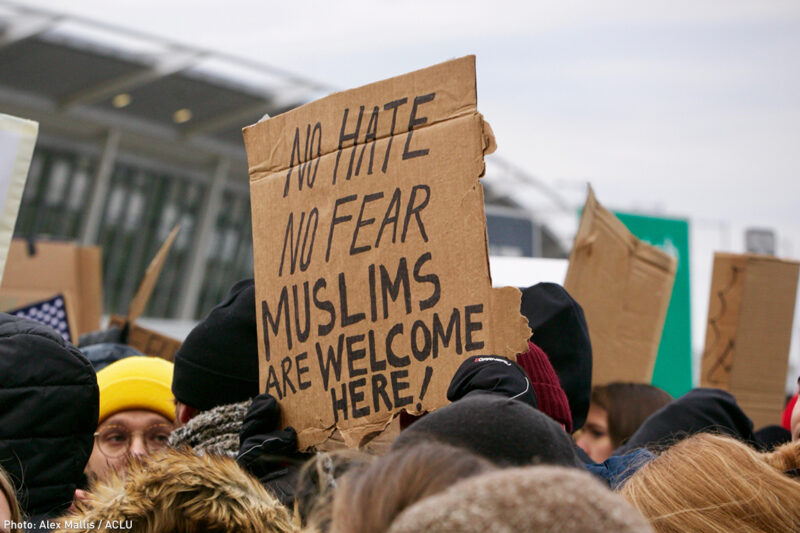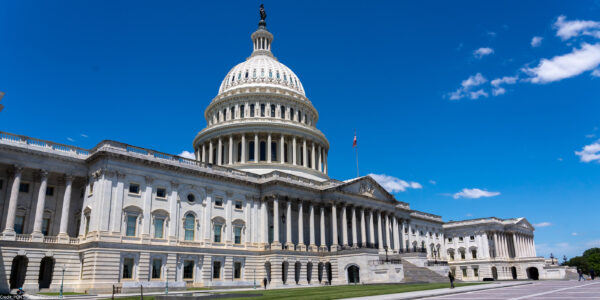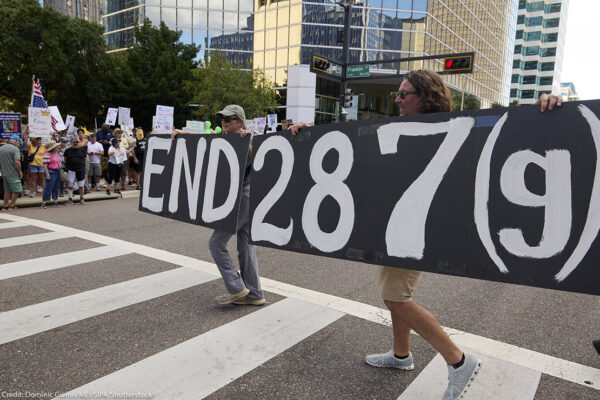
Today President Trump signed a new Muslim ban. The new executive order is a major retreat by the administration, reflecting that, as courts around the country have recognized, the original order was deeply flawed and totally unjustified. But the fundamental truth of this new order, like the old one, remains unchanged: The president promised to ban Muslims from the United States, and the ban is his attempt to make good on that unconstitutional and indefensible goal.
President Trump’s intentions regarding the Muslim ban have been clear. In a statement “ON PREVENTING MUSLIM IMMIGRATION” posted to his campaign website — and still available on it as I write — then-candidate Trump called for “a total and complete shutdown of Muslims entering the United States.” Again and again, he refused to disown this proposal, expressing his opinion that “Islam hates us” and that there are “problems with Muslims coming into the country.”
Instead of abandoning this odious idea in response to widespread criticism and outrage, Mr. Trump candidly explained that he would change the wording of his proposal but not its substance. “I’m looking now at territories,” he said. “People were so upset when I used the word Muslim. Oh, you can’t use the word ‘Muslim.’ Remember this. And I’m okay with that, because I’m talking ‘territory’ instead of ‘Muslim.’” Asked about the Muslim ban, he said, “[C]all it whatever you want. We'll call it territories, okay?” Rudy Giuliani, former mayor of New York and advisor to the president, explained that Trump asked him to figure out “the right way” to establish the Muslim ban “legally” and that he and others settled on using the word “countries” to achieve Trump’s goal.
Tell Your Senators to Oppose Muslim ban 2.0
Sure enough, when the original Muslim ban was signed, it did not use the word “Muslim,” instead purporting to single people out for exclusion from the United States based on their nationality.
But it was no coincidence that the seven countries singled out were all overwhelmingly Muslim, and account for over 80 percent of Muslim refugees entering the United States from 2014 to 2016. It was no coincidence that the order carved out special treatment for certain religious minorities, which the president promptly explained was intended to help Christians. It was, in other words, no coincidence that the president who promised to ban Muslims from entering the United States signed an order that would ban a large number of Muslims from entering the United States.
Courts refused to buy this transparent attempt to avoid the bedrock American commitment to freedom and equality among religions. As the ACLU’s legal director, David Cole, explained before the original order was signed, a government action motivated by intent to discriminate on the basis of religion is unconstitutional even if the text of the order does not name a particular religion to be harmed. Courts across the country agreed. And, starting with a temporary stay won by the ACLU and its partners at the National Immigration Law Center, the International Refugee Assistance Project, and the Worker & Immigrant Rights Advocacy Clinic the night after the Muslim ban was signed, courts have halted the ban — including a unanimous panel of the Ninth Circuit Court of Appeals.
In response to these court losses, the president has now signed a new order. The order backtracks dramatically — exempting not only green card holders but all current visa holders, delaying the implementation of the order, and eliminating some of its glaringly illegal elements. These changes further undercut the administration’s weak national security case for the ban, already rebutted by the government’s own assessments and the administration’s repeated delays in issuing it — including putting off the new order to seek favorable media coverage.
Despite the substantial ground the president has now conceded in the face of his legal defeats, however, the heart of the order remains. The order still singles out individuals from six of the same overwhelmingly Muslim countries, as promised in the same repeated pledges to institute a Muslim ban, and does so purportedly based on the same debunked national security arguments. Indeed, any suggestion that this new order represents a clean break from the prior one or from the president’s comments is undercut by various statements coming out of the White House, describing the new order as “a revised policy” that would advance “the same basic policy outcome for the country.”
Ultimately, in other words, the most fundamental flaw of the Muslim ban remains the same: It is still a ban, signed by a president who promised to bar Muslims from entering the United States, motivated by an intent to discriminate against Muslims, and that overwhelmingly affects Muslims rather than those of other faiths. Neither the president’s original offer to “call it whatever you want,” nor this most recent attempt to “revise” the order while pursuing “the same basic policy,” alters that core truth.
The Supreme Court warned in McCreary County v. ACLU of Kentucky of “trivializing” the inquiry into the purposes of a law, rejecting a “naïve” suggestion that “any transparent claim” of nonreligious justifications is enough to save the law, regardless of its context and history. The courts and the American people are not so naïve. They have seen and will continue to see the order for what it is: an attempt to achieve President Trump’s promise to institute a Muslim ban.
The new order remains deeply unconstitutional and an affront to the principles on which this country was founded. We at the ACLU, and other organizations, advocates, states, cities, and individuals across the country, will keep fighting in courts and will keep voicing our opposition to this abhorrent religious discrimination.
To stand up to the rising tide of religious bigotry, our shareable Know Your Rights cards describe what to do if you or someone you know experiences anti-Muslim discrimination.



